Welcome to Arrakis
Dune: Imperium takes place in the world of Frank Herbert’s Hugo-award-winning science fiction novel. For those unfamiliar with the novel, Dune is set in the distant future and centers around noble houses vying for control of the valuable “spice” found on the planet Arrakis. “Spice” is a drug valued highly across the galaxy, so naturally, control of Arrakis comes with placing a massive target on your back.
Since 1971, media adaptations of the beloved novel have been attempted, though nothing got off the ground until David Lynch’s 1984 film. Critical reception to the film was mixed, and the intellectual property spent the next thirty-seven years in various stages of development. In 2021, director Denis Villeneuve released the first part of his new Dune adaptation. To coincide with this release and capitalize on the mainstream appeal of the property, the Dune IP was used for a whole slew of new board game releases. Per BoardGameGeek, roughly twenty new titles were released since the media push behind the current films began.
Of those new titles, Dune: Imperium stands as a juggernaut. Released by Dire Wolf Digital in 2020, this brand-new adaptation of the source material recontextualizes the power struggle present in the books into a tense experience, where there are never quite enough resources, and players are expected to participate in politics, economics, and warfare all at the same time. Dune: Imperium has hovered around the BGG Top 10 for most of the time since its release, but does it live up to the hype?
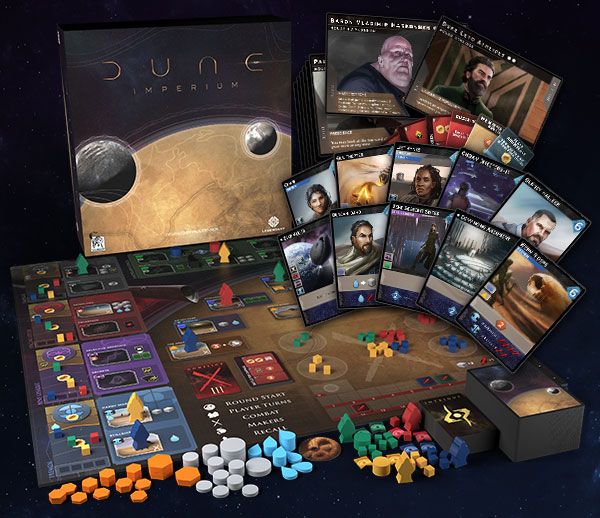
Secrets of Arrakis
Gameplay in Dune: Imperium borrows from multiple classic board game mechanics. Perhaps most prominently, it is a hybrid worker placement game and deck builder. In the race to collect 10 victory points (or at the end of ten rounds), players will play cards from their hand to send workers to matching spaces on the game board. These spaces will influence their economy in some way, thereby allowing players to acquire new cards, which in turn allows them more options for where to send their workers. This core gameplay loop is the center of Dune: Imperium’s elegant design, as the worker placement is dependent on the deck building, and vice versa.
Nearly every card in the game is multipurpose: the top portion of the card shows you where you can send a worker, and what additional effect (if any) the card has when played for worker placement. All of this is communicated through a reasonably simple iconography system, where different colored shapes indicate the types of spaces on the board. There are four faction icons, representing the four distinct factions you can influence to gain their associated bonuses, as well as three groups of spaces on the board: the Landsraad spaces all pertain to the High Council and need currency to activate their effects, City spaces all give you small bonuses while allowing you to deploy troops into battle, and the Spice Trade spaces all help you collect spice, which is a versatile resource in the game. Spice, water, and Solari (currency) are the three main resources in the game, and there is never enough of any to go around. Contributing to this scarcity is that each player starts with only two agents to place, though a third is available for a high cost.
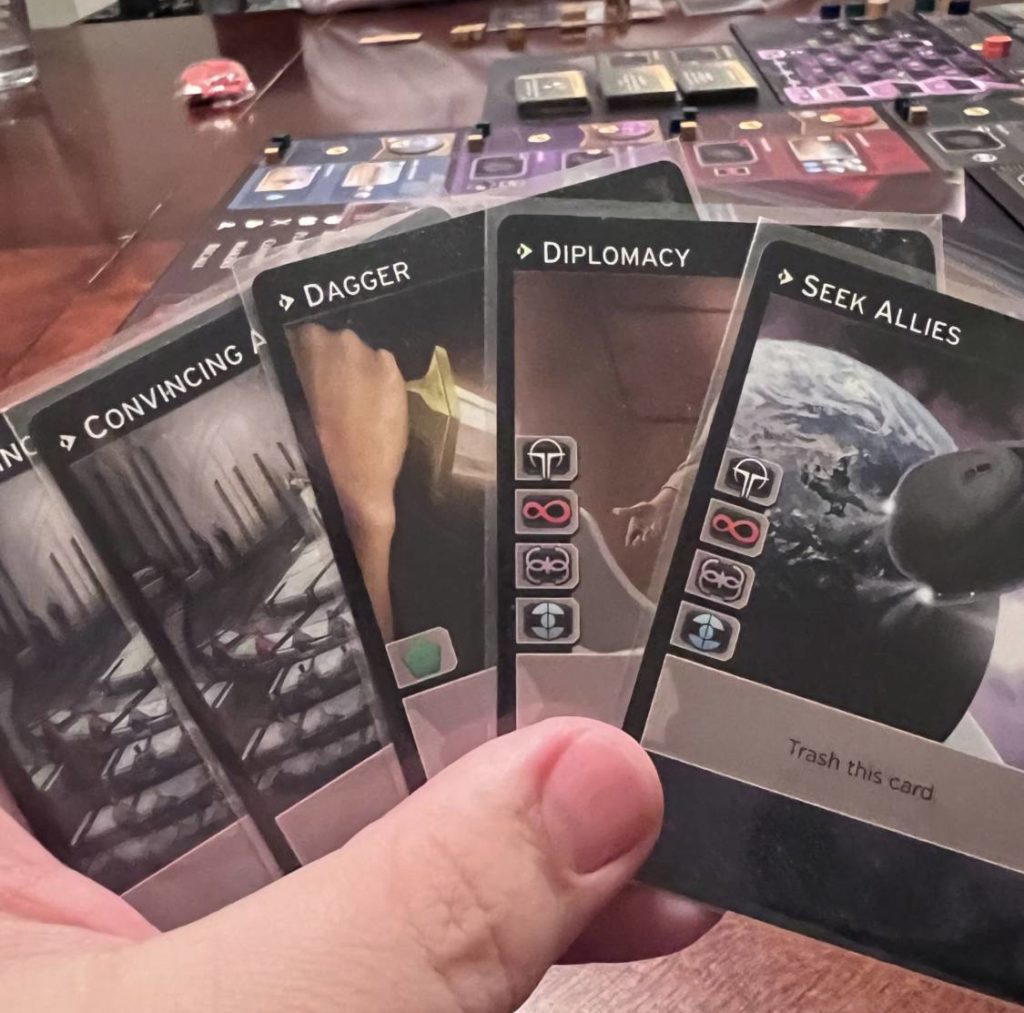
The bottom portion of each card has a separate set of symbols, and these activate when that card is in your hand after you have placed both of your workers. This is the “reveal turn”, and taking one means you’re either out of actions or strategically choosing to end this round without placing all your workers. Any cards remaining in your hand get placed face-up in front of you, and you gain the benefits listed on the bottom portion of the card. Typically, this will be in the form of influence, a temporary currency that expires at the end of the round but allows you to purchase new cards to add to your supply from the available pool. Some cards may also allow you to draw more cards, add combat power to your army, or have other various effects. It’s this dual purpose for each card that makes the deck building so fascinating, as you must select cards that open up new worker placement options for you, while also ensuring the hand you’re left with at the end of the round has enough resources on them to enable your deck building options.
Intrigue cards are acquired from some spaces and cards in the game and represent subterfuge, allowing you to drop surprise twists on your opponents. These can be played during your regular turns for a quick economic boost, during combat to add to your power, or during endgame to add to your VP total if certain conditions are met. At the end of each round, combat will occur, with the deployed troops adding their totals to any combat bonuses you gained from your reveal turn, along with any intrigue cards you play from your hand. The rewards from combat are determined by the conflict deck and offer everything from victory points to resources to influence on the four faction tracks.
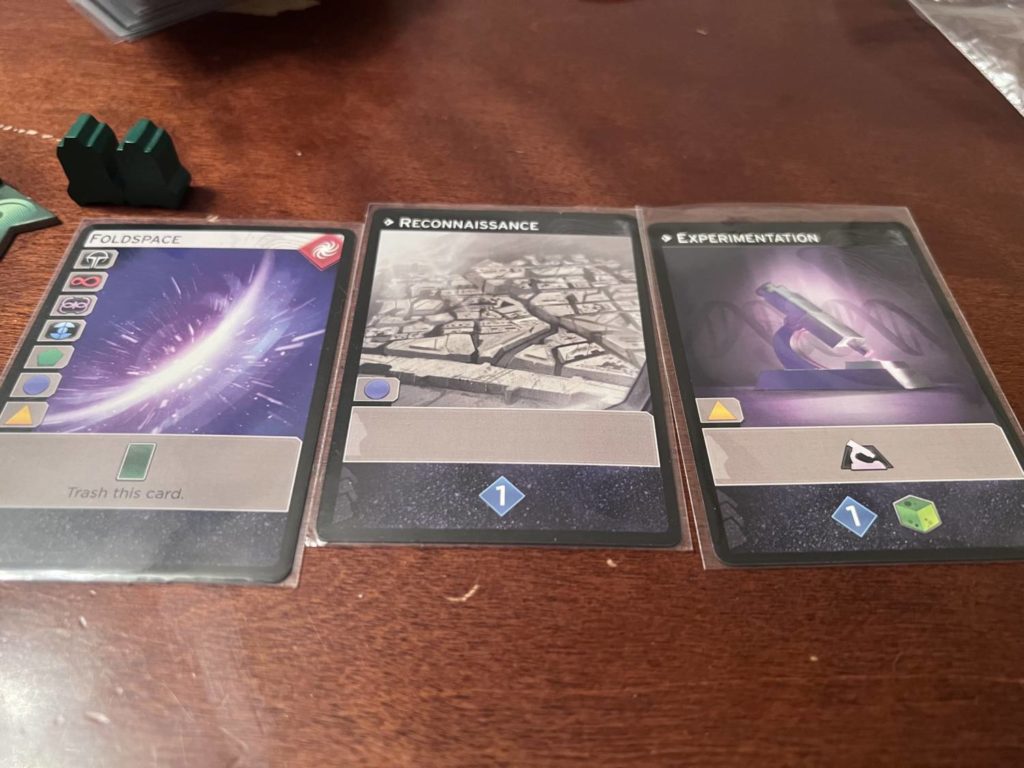
The Sands Come Alive
Dire Wolf Digital is a publisher with a history of commitment to quality components and artwork, from their work on Clank! to their digital adaptations of Root, Everdell, and A Game of Thrones: The Board Game. That trend continues here with artwork inspired by the 2021 motion picture by Clay Brooks, Raul Ramos, and Nate Storm. Every card is drawn in detail to match the actors in the motion picture, or locations and moments inspired by the novel. This can admittedly be a little jarring: I love the detail on the “Worm Riders” card, showing sand dripping from the mouth of a sandworm, but pulling my next card to see Jason Momoa as Duncan Idaho staring back at me can take me out of the immersion a bit. It’s a tricky proposition for a game to be faithful to the source material while using artwork featuring the likeness of real actors, but for the most part, the team of artists here hits a happy middle ground.
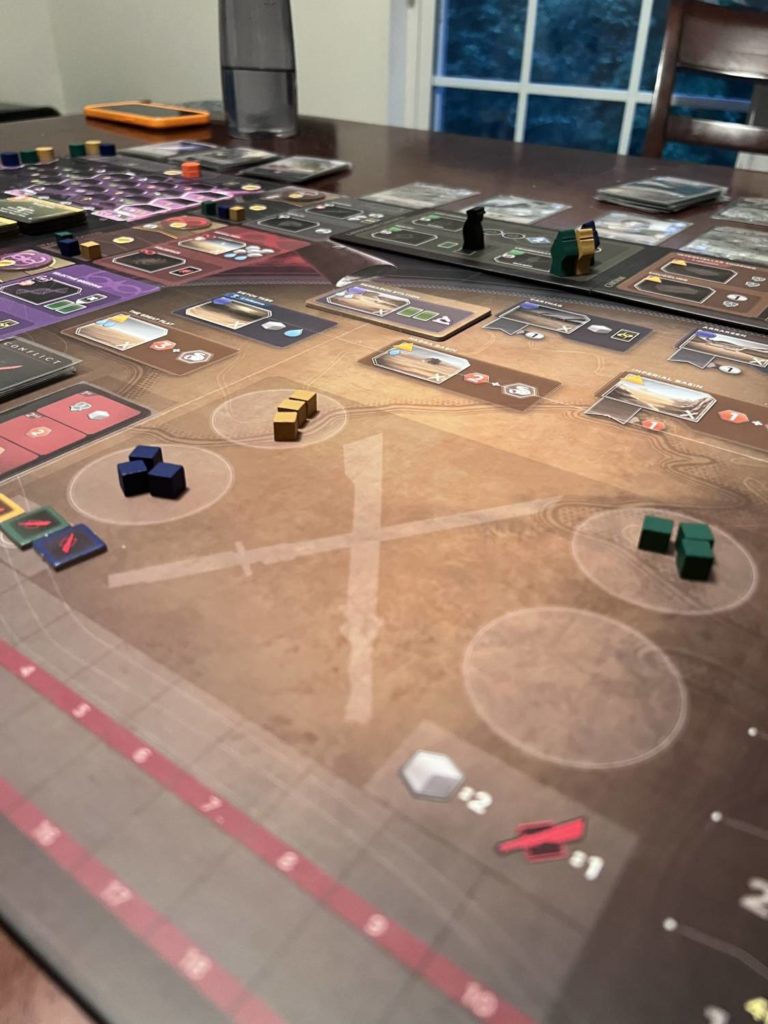
The board itself is designed with visual clarity in mind first and foremost. Artwork is limited to small squares next to each space, with a real focus on the iconography to help people gather information quickly from glancing at the board. This abstraction of the world of Dune sacrifices some immersion for ease of use, and from my experience, this is a welcome sacrifice. The iconography now only speeds up decision-making during turns for experienced players but also makes the game simple to teach to new players. If you know you need water, for example, it is very quick to glance at the board and immediately know which spaces are available to provide you with that resource.
The components are solid, sturdy wooden meeples. They come in bright, distinctive colors and serve their purpose well. I’m a sucker for good wooden pieces, and these certainly fit the bill. They’re nothing fancy, but in my plays, I never felt the need for anything more. For those who feel colored cubes and meeples are too abstract, Dire Wolf Digital offers an entirely optional upgrade pack for the components of the game. The upgrade pack swaps most of the meeples for miniatures, adding plenty of shiny plastic bits to the game if that’s more your speed. I appreciate Dire Wolf Digital keeping the base game simple to make it more cost-accessible, and I think offering an optional deluxe upgrade pack is a nice solution to accommodate all audiences for the game.
Scarcity As Strategy
All of the above combines in an enthralling strategic experience. Dune: Imperium always feels like you’re walking a tightrope, but it never feels overly punishing. From my many playthroughs of this game, it is rare for a player to ever truly feel 100% out of contention for the win. There’ll be many turns where you curse under your breath because this god-forsaken desert planet doesn’t have any water, which you desperately need to go out in the desert and get more spice, which you desperately need to bribe a faction to help you out in combat… but it’s this cycle of dependant needs that helps direct your strategy. Everyone else at the table is struggling with the same scarcity of resources, and there’s nothing quite like breathing that sigh of relief when the player before you opts to go to another space, leaving the exact one you need open to enable a combo for your turn.
Card choice is also more impactful here than I’ve seen in most other deck builders, and that is attributed to one simple fact: Dune: Imperium is a short game, relatively. Each player begins with ten cards in their deck, and the game lasts a maximum of ten rounds, though most games I’ve played have lasted somewhere in the seven-round range. You also will not be buying cards every single round, as there may not always be an option that you want, or you may not have enough influence from your reveal round. This means you’ll probably only be adding a handful of cards to your deck by the end of the game. In a pure deck builder like Dominion, the entirety of the deck building is built on the concept of constantly adding cards to your deck. Dune: Imperium makes adding a card to your deck a very special, strategic moment, and the scarcity of new cards makes each feel more impactful to how your deck plays out.
The various leaders you play as also offer different starting powers or bonuses, which may affect how you play the game. For example, Paul Atreides can glance at the top card of his deck at any point, allowing him to play more proactively and set up powerful turns in advance. Baron Harkonnen gets to secretly choose to influence two of the four factions before the game begins, but the other players will not find out which until later in the game, allowing him to play a political mind game with his opponents. These variable starting powers keep each playthrough feeling fresh, but they do not completely dictate the strategy as they do in other asymmetrical games like Root. You will not win or lose solely on the back of your leader’s unique ability, but by playing to your strengths and reacting appropriately to the board state.

Final Thoughts
It has been a very long time since I was so immediately enamored with a game like I have been by Dune: Imperium. Like Root and Terra Mystica before it, the second I finished my first playthrough of this game, I was fiending for the next chance I’d get to play (which was hours later on the very same day). I found myself thinking of optimal openings and strategies for each leader, or shuffling through the pile of available cards to identify cool synergies and combos to employ in the future. Simply put, Dune: Imperium is the first game in a while to make me shake up my list of top five games.
It is worth mentioning that my immediate love of the game had me rush out to pick up the Rise of Ix expansion, and I will not play without it. It’s not that the base game of Dune: Imperium is deeply flawed or needs fixing, but Rise of Ix fits like a glove with the base game and adds just enough to the formula that it feels essential. A further review will be coming from Meeple Mountain detailing what is added to the game in both Rise of Ix and the newest expansion, Immortality. Suffice it to say, if you have the means and enjoy the base game, don’t hesitate to throw Rise of Ix into the mix after a couple of plays. It’ll only enhance the experience.
As someone who typically approaches hype with a healthy dose of skepticism, my initial reservations surrounding Dune: Imperium were inevitable. Past experiences with intellectual property cash-ins left me wary of hidden shallowness masked by superficial allure. However, I am delighted to admit that I was wrong, as Dune: Imperium has firmly established itself as a timeless masterpiece in my collection. Though deceptively simple, its fusion of deck building and worker placement has been executed with such finesse that it continuously beckons me for more. With every game, I find myself immersed in the complex web of Arrakis’ power struggles, and just like the precious spice melange, I can’t stop craving more. In the vast desert of board games, Dune: Imperium reigns supreme, embodying the essence of the source material and ensnaring players in its addictive grasp. This game is the ‘spice’ that elevates board gaming to new heights. And you know what they say: the spice must flow.


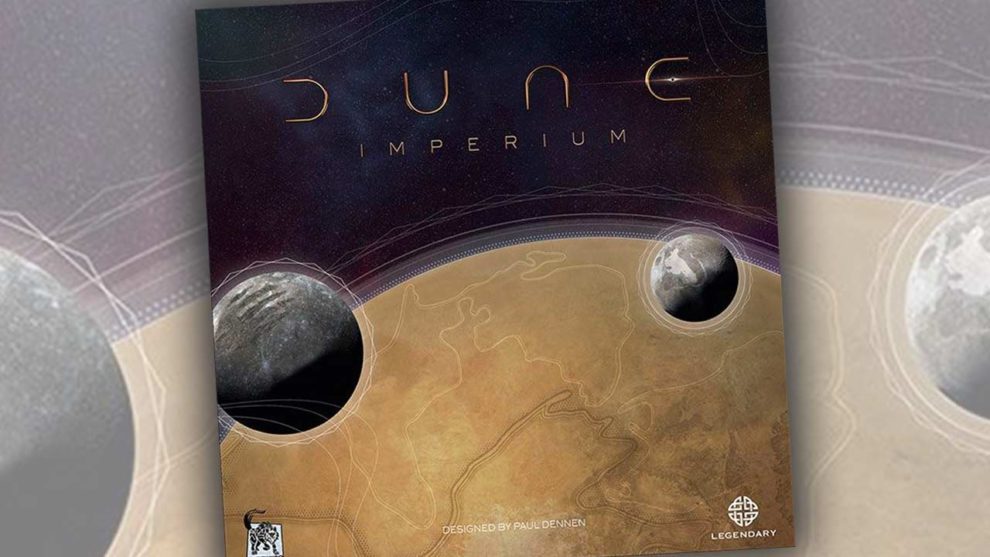









Add Comment